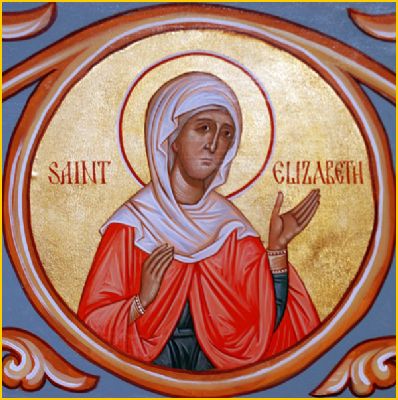|
|||
|---|---|---|---|
| This weekly bulletin insert complements the curriculum published by the Department of Christian Education of the Orthodox Church in America. This and many other Christian Education resources are available at http://dce.oca.org. | |||

The Church remembers Saint Elizabeth, who was privileged to give birth to the last and greatest of the prophets, John the Baptist. She also was privileged to be inspired by the Holy Spirit in some special ways. But the years before John's birth were certainly not a time of privilege. Elizabeth and her husband Zechariah were "both righteous before God, walking in all the commandments and ordinances of the Lord blameless" (Luke 1:6-7). But they had no children—the greatest of misfortunes. Still worse, their hopes of having a baby were slim because "both were advanced in years." So when the angel Gabriel told Zechariah that they would have a child and that this child would "make ready for the Lord a people prepared" (1:17), Elizabeth was deeply grateful. Unlike her husband, who foolishly doubted the archangel's word, she thanked God by saying, "Thus the Lord has done to me in the days when he looked on me, to take away my reproach among men" (1:25). The next extraordinary event in Elizabeth's life was the visit of her cousin Mary, who told Elizabeth that she, too, was going to have a baby. Elizabeth, at this, was "filled with the Holy Spirit" and her own baby leaped in her womb. Again, she was overwhelmed with gratitude and exclaimed, "And why is this granted me, that the mother of my Lord should come to me?" (1:43). Elizabeth's words "mother of my Lord" are very important. They are Biblical precedent for the Orthodox practice of referring to Mary as "Theotokos" or "Mother of God." This is another time when the Spirit visited Elizabeth in a special way: she is the one privileged to give Mary this title. The meeting with Mary was a private event: just the two women, two cousins, rejoicing in their impending births and in the goodness of God. But Elizabeth would soon be inspired again, this time at a very public moment. That came when she gave birth, and "her neighbors and kinsfolk heard that the Lord had shown great mercy to her, and rejoiced with her" (1:57). On the eighth day after the birth, preparations were made to circumcise the newborn child and it was assumed that he would carry on his father's name of Zechariah.
But to everyone's surprise, Elizabeth spoke up decisively and said, "Not so; he shall be called John." The people around her noted that there was nobody in the family named John. The unspoken question in their minds was, of course, where this name could come from, since it had no place in the parents' family history. The episode shows us that again Elizabeth was given the privilege of expressing God's will by the power of the Holy Spirit. We know that other barren women, like Hannah the mother of Samuel, suffered from the same kind of "reproach among men" that Elizabeth endured. But God is full of surprises, as Elizabeth, the elderly mother of John, was delighted to discover. |
|||
